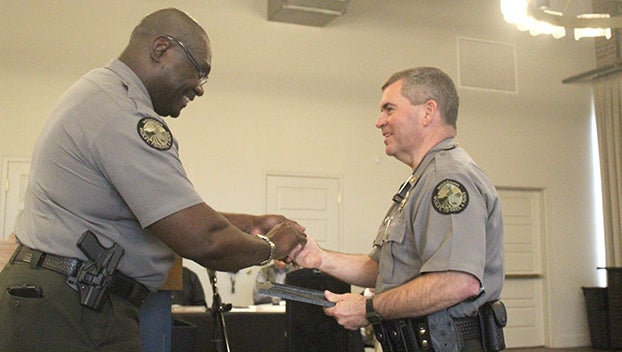Lt. Gov. Reeves pitches $1.1B BRIDGE Act
Published 10:18 pm Monday, February 19, 2018
Lt. Gov. Tate Reeve’s billion-dollar plan to mend and preserve roadways across the state could be good news for Lincoln County, but at least one supervisor is a bit too wary to get his hopes up.
District 5 Supervisor Doug Falvey is unsure if Reeve’s proposal will have much of an impact here.
“It depends on how much we’re going to get out of it. By the time it gets divvied up between all the cities and counties in the state, there’s no telling how much we’re going to get. But at least we’re getting something, because something is better than nothing,” he said.
The legislation, entitled “The BRIDGE Act,” would provide roughly $1.165 billion to municipal and county governments to help cover infrastructure maintenance costs. If signed into law, the apportionment would commence at the start of the 2019 fiscal year.
The bill would effectively amplify county and city roadway budgets without raising taxes. Reeves said the BRIDGE Act would increase the state’s long-term debt by roughly $150 million, but the bulk of the money promised by the legislation would come from a combination of existing revenue and federal subsidies.
Sen. Sally Doty, R-Brookhaven, who represents Copiah, Lawrence, Lincoln and Walthall counties, voiced support for the measure.
“The plan outlined by the lieutenant governor, today, is a good policy and a comprehensive approach,” she said.
Of the nearly $1.2 billion assured by the act, Reeves said $240 million would go to immediate local infrastructure needs, including county bridges, and $600 million would be allocated to long-term maintenance. An additional $200 million would also contribute to emergency bridge repair.
Furthermore, the bill would offer Mississippi cities an initial $125 million increase in state funding. Municipalities accepting that money would be required to match it dollar-for-dollar over a five-year period.
The legislation would also boost municipal tax diversions.
“Increasing the sales tax diversion will certainly help Brookhaven and other municipalities in our area,” Doty said.
Reeves said the bill should give the state economy a jumpstart and improve public safety. He also specified that the legislation should take advantage of any infrastructure incentives Congress might pass in the future.
That being said, the BRIDGE Act has a long way yet to go before reaching the governor’s desk. It currently rests in the Senate Finance Committee, of which Doty is a member, but it should hit the Senate floor by the chamber’s Wednesday committee deadline.
If it receives a majority approval from the Senate, the act will be funneled into a corresponding committee in the House of Representatives. At that point, members of the House could make changes to the legislation.
If it makes its way through the House’s committee process, the bill should come to a final vote, and, if it obtains a majority endorsement in the lower chamber, it will head to the governor’s mansion.
However, Rep. Becky Currie, R-Brookhaven, who represents Copiah, Lawrence and Lincoln counties, expects the bill to weaken in committee.
She said the governor recently asked state representatives to hold off on tackling infrastructure spending until President Donald Trump releases his plan for national roadway funding.
Congress is in the process of formulating a budget to reinforce infrastructure nationwide, and they are expected to produce pertinent legislation before the end of the current session. Therefore, Currie said it would be wise to wait and see how much money the federal government is willing to contribute to Mississippi roads and bridges before developing a plan.
“If we’re about to be handed the golden egg, let’s wait a couple of months and see what happens,” she said.





